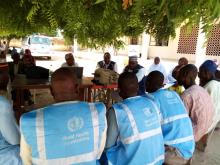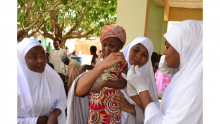Polio infrastructure remains crucial for mounting initial response to disease outbreaks in Nigeria
Abuja, 23 October, 2018 - “My phone rang on 22 August. The familiar voice on the other side sounded anxious. It was the local government area Director of Health who said ‘Dr Halima, we need you to come down to the clinic and support us immediately’. With over 10 years working on polio eradication, I realized that another call to duty beckons,” says Dr Halima Isa, an environment health officer supporting in active case search for polio, cholera and other emergency cases in the North East.
After more than two years without the detection of wild polio virus (WPV) in Nigeria, the country reported four cases in security compromised areas of Borno State in July and August 2016. In response to detection of polio in Borno, the government declared the outbreak a national public health emergency, followed by implementation of large-scale supplementary immunization activities (SIAs). The last WPV in Nigeria was reported on 27 September 2016.
Capacity to promote health and protect people
Notwithstanding the interruption of polio transmission, the personnel continue to support implementation of SIAs. The government and Global Polio Eradication Initiative (GPEI) partnership, including the World Health Organization (WHO), also rely on the vast polio infrastructure to curb disease outbreaks. Dr Halima is part of the polio structure, made up of personnel that are engaged at different levels to carry out PEI activities, namely: vaccinators, team supervisors, community leaders, ward focal persons, local government authority (LGA) and state teams.
In North Eastern Nigeria, despite the high level of insurgency, which has affected many public health facilities, the polio infrastructure is being utilized to monitor and curb cholera in five states namely, Adamawa, Bauchi, Borno, Gombe and Yobe with encouraging results.
“In terms of combating cholera, the polio personnel are usually engaged for house-to-house active case search, dissemination of information on personal hygiene and other preventive measures as well as administration of oral cholera vaccines during campaigns. Furthermore, the vaccination teams serve as community health champions during risk communication activities.” Dr Zuwaira Ibrahim Hassan, Bauchi Commissioner for Health said. “This approach has greatly helped to curb cholera at many levels in the State”, she added.
Nigeria experienced unprecedented outbreak in early 2018. Dr Emmanuel Musa, WHO Incident Manager for Lassa fever Management Team observed, “the polio teams on ground in the states were crucial for mounting the initial response to the Lassa fever outbreak and have continued to be WHO’s frontline technical support to the Nigeria Centre for Disease Control (NCDC), State and LGA teams”.
Success story for achieving universal health coverage
Discussions are currently ongoing with the government of Nigeria on engaging the infrastructure to achieve universal health coverage mandate.
“The polio infrastructure in Nigeria is a well - developed system that government and partners can leverage upon to achieve the goal of universal health coverage,” Dr Wondimagegnehu Alemu, the WHO Country Representative in Nigeria said. He added, “We will continue to work closely with the Federal and State Governments to ensure successful surveillance and response to the cholera crisis and other ongoing outbreaks, using this cohort of frontline health workers.”
Owing to its success, the infrastructure is currently involved in the control of priority diseases such as measles, cholera, tetanus, tuberculosis and malaria. The infrastructure is considered dependable in ensuring access to healthcare by the underserved populations in remote locations through the provision of mobile clinics and health camp services for treatment of minor ailments.
Addressing other issues will not jeopardize polio eradication
With the huge contributions and investments by donors and partners beyond polio eradication to save lives and impact positively on people’s health, government and partners are ensuring through certification standard surveillance that gaps are not created.
The personnel according to Dr Alemu are still involved in vaccination activities as well as data collation, analysis, reporting and archiving using mobile phones fashioned after the real-time tracking and reporting by polio vaccination teams. These activities fit into the polio essential functions of surveillance, outbreak response and containment that vaccine-preventable disease surveillance and laboratory networks rely on to save millions of lives threatened by diseases such as Yellow fever and meningitis. Core indicators used to monitor acute flaccid paralysis (AFP) surveillance sensitivity and quality shows a Non Polio AFP rate of 17.5/100,000 under 15 population and a stool adequacy of 98% in 2017.
Support for Polio eradication to Nigeria through WHO, is made possible by funding from the Bill & Melinda Gates Foundation, Department for International Development (DFID – UK), European Union, Gavi, the Vaccine Alliance, Government of Germany through KfW Bank, Global Affairs Canada, United States Agency for International Development (USAID), Community Chest Korea, KOFIH (Korea), Rotary International and the World Bank.
Kindly follow us on Social Media:




